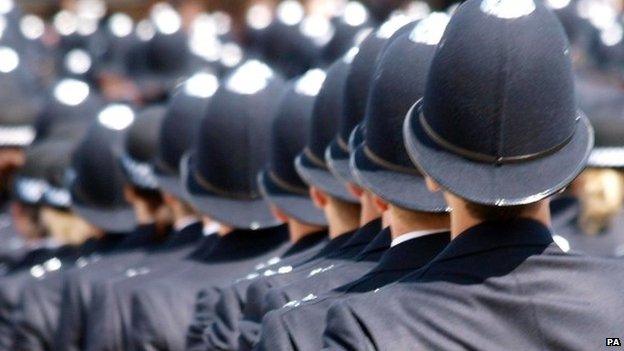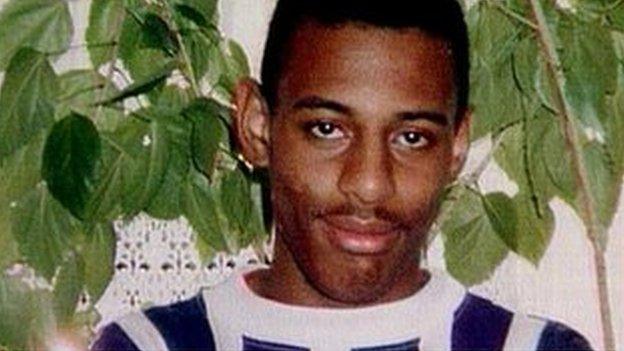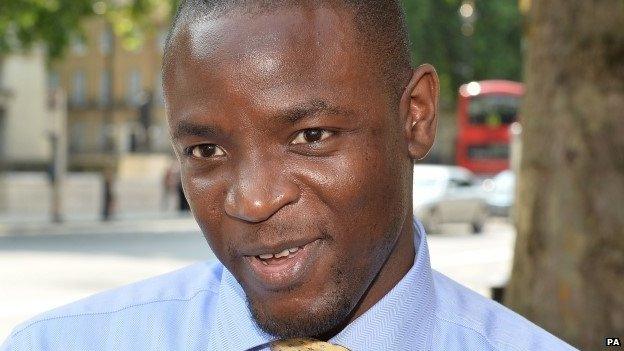Undercover police: What have we learned?
- Published

A review into allegations of corruption surrounding the Stephen Lawrence murder investigation has published its damning verdict.
It prompted the home secretary to announce a public inquiry into undercover policing.
The report by Mark Ellison QC, external, which was commissioned by the home secretary, led to Theresa May making a statement to the House of Commons.
She told MPs: "The problems of the past have a danger of infecting the present, and can lay traps for the future. Policing stands damaged today."
Operation Herne, external, the current criminal investigation into Scotland Yard's Special Demonstration Squad (SDS), also issued an update report.
So, what did we learn?
Home Secretary Theresa May: "Only a public inquiry will be able to get at the full truth"
Theresa May statement
New public inquiry into undercover policing to be held after final report of Operation Herne - the criminal investigation into SDS undercover police unit - and completion of a review into possible miscarriages of justice
New offence of police corruption that would replace one of misconduct in public office announced. Government legislation is likely within weeks, says the BBC's chief political correspondent Norman Smith
Chief Inspector of Constabulary Tom Winsor to look at the anti-corruption capabilities of police forces, including professional standards departments
The director general of the National Crime Agency to "consider quickly" how best outstanding lines of inquiry into alleged corruption by a specific officer - and possibly others - can be investigated
A "forensic external review" into how much the Home Office knew about SDS
A review, led by Mark Ellison and working with the Crown Prosecution Service, into possible miscarriages of justice caused by SDS's secrecy
New code of ethics for police
Expansion and "emboldening" of Independent Police Complaints Commission, so that it is responsible for dealing with all serious and sensitive cases involving the police
Stronger protection for whistleblowers in the police. Proposals to be brought to the House in due course
From the autumn, people from outside the police can be brought in to senior positions. A fund for direct entrant superintendents from then until spring 2018.

Mrs May said: "Stephen Lawrence was murdered over 20 years ago and it is still deplorable that his family have had to wait so many years for the truth to emerge."
Ellison review
The report from Mark Ellison QC - who successfully prosecuted Gary Dobson and David Norris in 2012 for Stephen's murder - was entitled the Stephen Lawrence Independent Review; it considered possible corruption and the role of undercover policing in the Stephen Lawrence case.
It found:
A Special Demonstration Squad "spy" worked within the "Lawrence family camp" during the Macpherson inquiry, which looked into the way the police had investigated Stephen Lawrence's death
This was "highly questionable"
The "spy" - referred to as N81 - was found to have met acting Detective Inspector Richard Walton. Mr Walton had been seconded to the MPS Lawrence review team, responsible for making submissions to the Macpherson inquiry
This meeting was "a completely improper use" of intelligence
Information on undercover policing had been withheld from the Macpherson inquiry
The review was unable to make "definitive findings" concerning former undercover officer Peter Francis's claims and suggested a public inquiry could be better placed to do so
There were "reasonable grounds" to suspect one of the detectives on the original Stephen Lawrence murder investigation - Det Sgt John Davidson - acted corruptly
There was no evidence of corruption by other officers, but there were lines of inquiry which may uncover other cases
The Independent Police Complaints Commission 2006 report into corruption allegations and the Metropolitan Police's own review in 2012 were inadequate
Scotland Yard's record keeping on its own investigations into police corruption were a cause of concern, with key evidence the subject of mass shredding in 2003
Operation Herne
Set up in 2011 in response to allegations made by the Guardian newspaper about alleged misconduct and criminality engaged in by members of the SDS, the operation is led by Mick Creedon, chief constable of Derbyshire police.

There was no evidence the Met attempted to smear Duwayne Brooks, said Operation Herne
It published its first report in July last year. In Thursday's update, it said:
It has found "no evidence" that a member of SDS was tasked to smear murdered Stephen Lawrence's family - as claimed by former undercover officer Peter Francis
No evidence Peter Francis was tasked to smear or investigate Duwayne Brooks, Stephen's friend who was with him when he was murdered
No evidence Mr Francis was prevented by managers within Special Branch from making disclosures to the Macpherson Inquiry
On the question of whether criminal charges should be brought over sexual relationships SDS officers had with unsuspecting women, there were "no sexual offences committed however, the offence of misconduct in public office may be applicable"
It found that while management did not authorise the relationships, a "tradecraft" document gave informal advice about those situations
A "distinct lack of intrusive management by senior leaders within the Metropolitan Police Service appears to have facilitated the development and apparent circulation of internal inappropriate advice regarding an undercover police officer's engagement in sexual relationships"
Three undercover officers - one of whom is still serving - could face prosecution
- Published6 March 2014
- Published6 March 2014
- Published6 March 2014
- Published24 February 2014
- Published18 September 2013
- Published26 July 2013